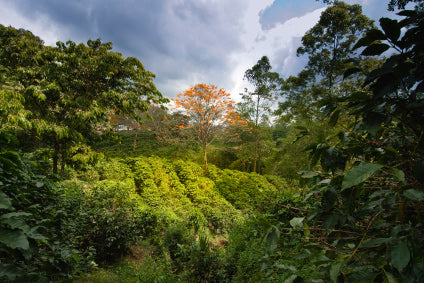Who doesn’t love coffee? Okay, besides that one weirdo friend of yours who doesn’t like the taste (they are probably a psychopath by the way), most people love coffee. We love it to the point where it is a staple in most homes. I know it's a necessity in my house for sure. One that we freak out about when it's gone! Why is this? What sort of powers does this magic bean possess? In reality there are many, but the big one most people would shout out when answering this question is, caffeine! Or coffees ability to wake us up and get us going. While this is important to most of us, especially in the morning, there are other properties in coffee that may be even more beneficial.
While no one knows exactly how or when coffee was discovered, it’s heritage can be traced back centuries to the ancient coffee forests on the Ethiopian plateau. Here is where the legend of coffees discovery takes hold. The legend says the goat herder Kaldi first discovered the potential of these beloved beans.
The story goes that that Kaldi discovered coffee after he noticed that after eating the berries from a certain tree, his goats became so energetic that they did not want to sleep at night. Kaldi reported his findings to the abbot of the local monastery, who made a drink with the berries and found that it kept him alert through the long hours of evening prayer. The abbot shared his discovery with the other monks at the monastery, and knowledge of the energizing berries began to spread.
Coffee cultivation and trade began as word moved east and coffee reached the Arabian peninsula. This is where coffee begins a journey which would bring these beans across the globe. By the 15th century, coffee was being grown in the Yemeni district of Arabia and by the 16th century it was known in Persia, Egypt, Syria, and Turkey. It didn’t stop there! European travelers to the Near East brought back stories of an unusual dark black beverage. By the 17th century, coffee had made its way to Europe and was becoming popular across the continent. Coffee began to replace the common breakfast drink beverages of the time — beer and wine! Those who drank coffee instead of alcohol began the day alert and energized, and not surprisingly, the quality of their work was greatly improved.
In the mid-1600's, coffee was brought to New Amsterdam, later called New York by the British. Though coffee houses rapidly began to appear, tea continued to be the favored drink in the New World until 1773, when the colonists revolted against a heavy tax on tea imposed by King George III. The revolt, known as the Boston Tea Party, would forever change the American drinking preference to coffee! "Coffee - the favorite drink of the civilized world." - Thomas Jefferson
As the word continued to spread about this powerful bean and its popularity grew, so did the demand for it. This started fierce competition to cultivate coffee outside of Arabia. The Dutch, who didn’t get seedlings until latter half of the 17th century, first attempted to plant them in India which failed. It wasn’t until they planted them in Batavia, on the island of Java in what is now Indonesia, that they were successful in their efforts.
These plants thrived and soon the Dutch had a growing and productive coffee trade. This lead to the expanded cultivation of coffee trees on the islands of Sumatra and Celebes. The expansion of coffee doesn’t end there! Missionaries and travelers, traders and colonists continued to carry coffee seeds to new lands, and coffee trees were planted worldwide. Plantations were established in magnificent tropical forests and on rugged mountain highlands. Some crops flourished, while others were short-lived. New nations were established on coffee economies. Fortunes were made and lost. By the end of the 18th century, coffee had become one of the world's most profitable export crops. After crude oil, coffee is the most sought commodity in the world.
Now that we have a background on the history of coffee, which is almost as rich as its taste, we can look into the health properties. As you can see the history of coffee begins with its ability to energize us, but its benefits go much deeper than that! This is mainly due to the various nutrients and compounds found in coffee.
One single cup of coffee contains 11% RDI or “Reference Daily Intake” of vitamin B-2, 6% RDI of vitamin B-5, 3% RDI of manganese and potassium, as well as 2% RDI of magnesium and niacin or vitamin B-3. While these seem like low percentages, most people enjoy more than one cup of coffee a day. This can cause these levels to add up quickly.
Beyond vitamins and minerals, coffee contains powerful antioxidant compounds that are incredibly beneficial to us. Antioxidants are “cleaners” and oxidize free radicals in the body to form harmless substances that can then be flushed out of the body.
The antioxidant properties present in coffee can help in losing weight, preventing obesity related disease, prevent diabetes, protect the liver, prevent Alzheimer's Disease, Dementia, Parkinson’s Disease and some forms of cancer to name a few! This is so important for those who consume a western diet, because coffee is usually the main source of these compounds.
These power packed beans still have more to give! As if helping protect your brain from disease like Alzheimer’s, Parkinson’s and Dementia wasn’t enough, coffee can actually improves various aspects of brain function. This includes memory, mood, vigilance, energy levels, reaction times and general mental function!
Due to the fact that coffee has the various vitamins, minerals and antioxidants that I mentioned, studies have found that it may be key to slowing the aging process and lowering your overall risk of death! This is because coffee consumption has been positively associated with longer telomere length, a biomarker of aging whose shortening can be accelerated by oxidative stress.
Now that you know why people have craved coffee for centuries and how it may actually improve your health and extend your life. There is one question left to ask, what coffee should I buy? No worries, I got you covered there too. First off, not all coffee is created equal. With the many cases of contamination, including fecal bacteria in Starbucks coffee, as well as mold in the form of mycotoxins being present in coffee. It's easy to find yourself wondering where you can get safe, healthy coffee.
To avoid pesticides, insecticides, herbicides, fungicides and other farm chemical contaminants, I recommend buying organic coffee. These chemicals have been determined to cause cancer by various studies and should have no place in your morning cup of coffee! Ideally this coffee should also come from small batch roasters and sourced from eco-friendly, sustainable farms. These factors help ensure that you will be brewing the freshest, highest quality coffee possible!
Organic coffee contains vitamins, minerals and higher levels of antioxidants needed by the body for several health benefits like protection from cell damage and boosting the immune system! The benefits of organic coffee consumptions don't just benefit the coffee drinker. Farmers who produce certified organic coffee are often "Fair Trade" compliant which guarantees a higher pay rate to employees. They also benefit from the fact that organic coffee beans and the soils in which they are grown are free from residues, chemicals and artificial fertilizers. This is great for the environment and the people living in it!
The environment also benefits from organic coffee production because unlike conventional coffee, organic coffee does not aid in deforestation. In fact, it aids in the conservation of wildlife, birds, vegetation and prevention of soil erosion and diseases. These are important things to keep in mind the next time you find yourself shopping for coffee! Help your health, the health of the environment and promote better working environments and wages by supporting organic, fair trade coffee companies! You just might find that you keep the doctor away with a cup of coffee a day in the process!



















